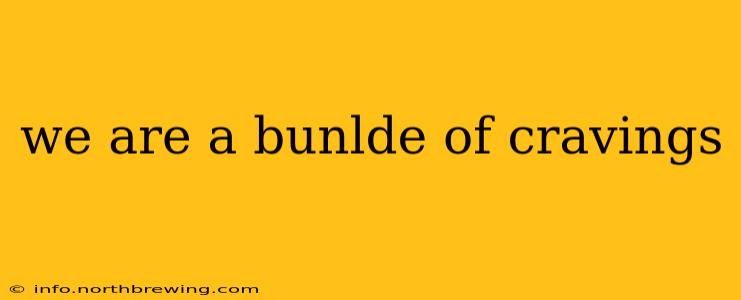We're a Bundle of Cravings: Understanding and Managing Our Food Desires
We've all been there. That overwhelming urge for something specific, a craving so intense it feels like it controls our actions. Whether it's a salty snack, a sugary treat, or a rich, decadent dessert, cravings can be powerful and persistent. But what actually are cravings, and how can we navigate them without derailing our health goals? This comprehensive guide dives into the science behind cravings, explores common triggers, and offers practical strategies for managing those intense desires.
What Causes Food Cravings?
Food cravings aren't simply a matter of willpower; they're complex physiological and psychological responses. Several factors contribute:
-
Nutrient Deficiencies: Your body might be signaling a need for specific nutrients. A craving for chocolate, for instance, could indicate a magnesium deficiency. Cravings for salty foods often point to electrolyte imbalances.
-
Hormonal Fluctuations: Changes in hormone levels, particularly in women during menstruation or pregnancy, can significantly impact cravings. Fluctuations in blood sugar can also trigger intense desires for sugary foods.
-
Emotional Factors: Stress, anxiety, boredom, sadness – these emotions can lead to emotional eating, often involving comfort foods high in sugar, fat, or salt. Cravings can become a coping mechanism for difficult feelings.
-
Learned Associations: We develop associations between certain foods and positive experiences (e.g., celebrating with cake). These learned associations can trigger cravings even when we're not physically hungry.
-
Food Marketing and Advertising: The constant bombardment of enticing food advertisements plays a significant role in shaping our desires and preferences.
Are Cravings a Sign of Addiction?
This is a complex question with no easy answer. While food cravings themselves aren't necessarily indicative of addiction, the repetitive, compulsive seeking of certain foods, despite negative consequences, could be a symptom of disordered eating or even an addiction. If your cravings significantly impact your life, leading to distress, health problems, or social difficulties, seeking professional help is crucial.
How Can I Control My Cravings?
Managing cravings is a multifaceted process requiring a combination of strategies:
-
Mindful Eating: Pay attention to your body's hunger and fullness cues. Eat slowly, savor your food, and avoid distractions while eating. This helps establish a healthier relationship with food.
-
Balanced Diet: A diet rich in whole, unprocessed foods provides the nutrients your body needs, reducing the likelihood of nutrient-driven cravings.
-
Hydration: Dehydration can sometimes be mistaken for hunger or cravings. Drink plenty of water throughout the day.
-
Stress Management: Employ stress-reducing techniques like exercise, yoga, meditation, or spending time in nature.
-
Sleep Hygiene: Adequate sleep is crucial for regulating hormones and managing cravings.
What Foods Trigger Cravings the Most?
Highly processed foods, laden with sugar, unhealthy fats, and salt, are notorious for triggering intense cravings. These foods often stimulate reward pathways in the brain, leading to a cycle of consumption and desire. Foods high in refined carbohydrates also contribute to blood sugar fluctuations, prompting cravings later on.
How to Overcome Sugar Cravings?
Sugar cravings are exceptionally common. Strategies to manage them include:
-
Gradually Reduce Sugar Intake: A sudden drop in sugar can lead to intense withdrawal symptoms and cravings. Reduce your intake gradually to minimize these effects.
-
Increase Fiber Intake: Fiber helps stabilize blood sugar levels, preventing sharp spikes and crashes that trigger cravings.
-
Choose Whole Foods: Opt for naturally sweet foods like fruits, which offer fiber and other nutrients.
-
Satisfy Sweet Cravings Healthily: Dark chocolate (in moderation) or fruit can provide a healthier alternative to processed sweets.
Understanding the complexities of cravings is a journey. By recognizing the underlying causes and implementing practical strategies, we can navigate these intense desires and cultivate a healthier relationship with food. If you're struggling to manage your cravings, consider seeking the guidance of a registered dietitian or therapist. They can provide personalized support and help you develop a sustainable approach to managing your food desires.
